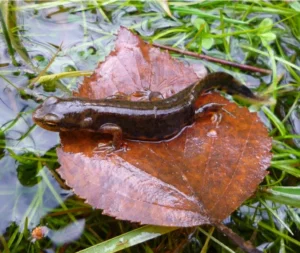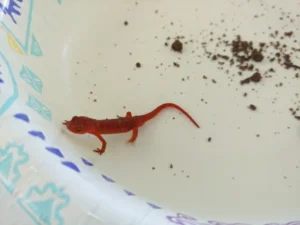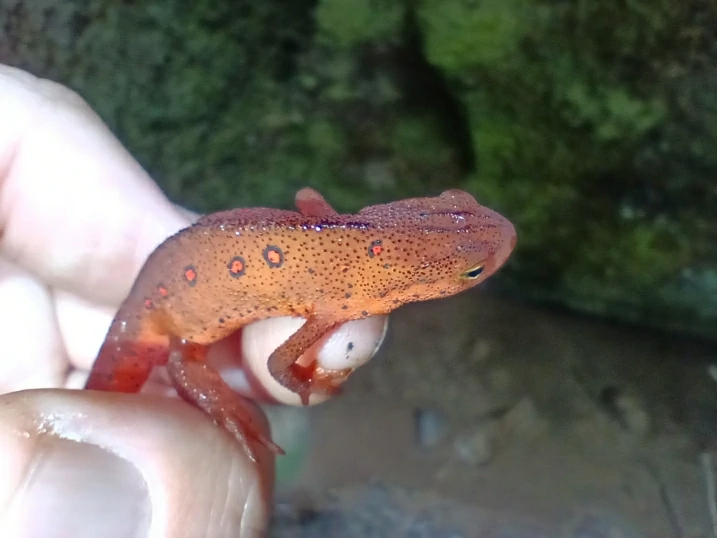Have you ever spotted a small, smooth newt slipping through a pond or hiding under leaves? You might have wondered: can I pick it up safely?
Newts can be touched carefully, but it’s not always safe for them or for you. Their skin is delicate and covered in a protective layer of mucus. Oils, soap, or even sweat from human hands can hurt them. Some newts also produce mild toxins, so touching them without care could irritate your skin or eyes.
Why Newts Have Sensitive Skin
Newts have very thin, permeable skin. This lets them absorb water, oxygen, and even chemicals straight through their skin.
It’s one of the things that helps them live both in water and on land.

But thin skin has a downside. Oils, lotions, or soap residue can damage it and mess up their natural protective mucus.
Even small amounts of bug spray or hand sanitizer can be harmful.
For example, if you pick up a newt after handling soap, you could accidentally remove the mucus layer that keeps it healthy in water.
That makes the newt more likely to get infections or dry out.
Are Newts Poisonous to Humans?
Most newts aren’t deadly to people, but many species make mild toxins to keep predators away. These toxins usually come from their skin.
-
Common European newts have toxins that can irritate skin if you handle them carelessly.
-
North American newts, like the Eastern newt (especially the red eft stage) produce tetrodotoxin. It’s harmful if swallowed but not dangerous through casual contact.

Basically, you won’t get seriously sick from touching a newt, but you should avoid touching your face or eyes afterward.
Wash your hands well. The toxins are meant to keep predators away, not hurt humans, but they can still sting or irritate.
How to Touch a Newt Safely
If you need to handle a newt (maybe to move it out of danger) here’s the safest way:
-
Wet your hands first: This helps protect their skin and mucus.
-
Be gentle: Support their body and don’t squeeze.
-
Keep it short: Don’t hold a newt for long.
-
Wash your hands afterward: This keeps you safe from mild toxins and bacteria.
Imagine picking up a tiny newt from a shallow pond. Your hands are wet, and you cradle it gently for a few seconds before putting it back.
This short, careful interaction usually won’t hurt the newt.
Why Handling Can Stress Newts
Even careful handling can stress newts. Stress can make them hide more, eat less, or even affect their immune system.
Their small bodies are very sensitive to changes in temperature, moisture, and surroundings.
If you see a newt in the wild, it’s usually best to watch rather than touch.
Seeing them from the edge of a pond can be just as exciting, and it keeps them safe.
Can Children Safely Touch Newts?
Kids are naturally curious, but supervision is key with newts.
-
Teach them to wet their hands before touching.
-
Show them how to be gentle, no squeezing, poking, or chasing.
-
Limit the interaction to a few seconds.
This helps children learn respect for wildlife while staying safe. Watching a newt glide through the water can be just as fun as holding it, and much safer for everyone.
Do Captive Newts Like to Be Handled?
Some pet owners wonder if newts can get used to handling. Most newts don’t enjoy it. Even captive newts like quiet spots and hiding places.

They can tolerate brief handling, but too much touching stresses them out.
Giving them plenty of hiding places, shallow water, and moist land in a tank reduces the need for handling and helps them feel secure.
You can still enjoy interacting safely by watching their behavior, feeding them carefully, or seeing them explore.
Signs a Newt Is Stressed
If you do touch a newt, watch for signs of stress:
-
Excessive mucus secretion
-
Trying to escape quickly
-
Staying still and stiff for a long time
-
Color changes in some species
Seeing these signs means it’s time to put the newt back in water or a hiding spot. Stress is normal, but too much can be harmful.
How to Watch Newts Safely
You don’t have to touch newts to enjoy them. Watching them in ponds or streams is fascinating:
-
See their slow hunting under lily pads.
-
Watch them flick their tails while swimming.
-
Notice little dances during breeding season, where they wave tails to attract mates.
Watching like this lets you enjoy their habits without causing stress or harm.
Can Newts Carry Diseases?
Newts are usually healthy, but like other amphibians, they can carry bacteria like Salmonella. Washing hands after handling is important.
This is another reason to keep touching to a minimum. It’s not that newts are dangerous, just that hygiene protects both you and the newt.
Conclusion
So, are newts safe to touch or handle? Yes, but only carefully and when necessary.
Newts are delicate, with sensitive skin and mild toxins. They live best when left in their natural habitats or safe captive environments.
Respecting their safety helps them live longer, healthier lives, and lets you enjoy their quiet, interesting world safely.
Next time you see a newt, remember: sometimes the best way to interact is just to watch and let it glide quietly through its watery home.
Hi, my name is Ezra Mushala, i have been interested animals all my life. I am the main author and editor here at snakeinformer.com.

